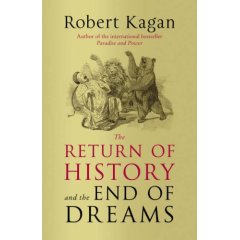
How times have changed. Less than a decade ago, Robert Kagan and William Kristol described the outlines of what they labelled a “neo-Reaganite” American foreign policy. In their book Present Dangers (2000), they explained how American military power should be used to reorder the world: “To many the idea of America using its power to promote changes of regime in nations ruled by dictators rings of utopianism. But, in fact, it is eminently realistic...how utopian is it to imagine a change of regime in a place like Iraq? How utopian is it to work for the fall of the Communist party oligarchy in China after a far more powerful and, arguably, more stable such oligarchy fell in the Soviet Union? With democratic change sweeping the world at an unprecedented rate over these past 30 years, is it ‘realist' to insist that no further victories can be won?”

This “neo-Reaganite” vision is evidently one of those dreams that a sadder but wiser Kagan understands has ended. Hence his new book The Return of History and the End of Dreams. The post-somnambulist Kagan now points out that after the cold war, America pursued “an expansive, even aggressive global policy,” and that “in shaping a world to suit their values, they have compelled others to bend to their will” in ways that make Americans intensely uncomfortable. Iraq is still a mess; China has not collapsed in the face of American hegemony, and indeed is rising at breakneck speed to achieve superpower status, while Russia has recovered and is reclaiming the foreign policy space of the former USSR. The era of American predominance is giving way to one in which the United States has to share power with the likes of China, Russia, India, and the rest. This is the “return of history” to which the book's title refers.

This is a peculiar interpretation of the contemporary world, one that betrays a great nostalgia for the cold war and tries to cram messy reality into categories that simply do not fit. For while it is certainly true that American hegemony is eroding, “autocracy” is not a strong or consistent set of ideas around which the rest can rally, as was once the case with Marxism-Leninism. China, for example, has abandoned any principled belief in communism and has replaced it with a combination of Chinese nationalism and legitimacy based on economic growth. To the extent that there is a principle underlying Beijing's foreign policy, it is an assertion of a right to sovereignty that prevents China from being criticised by foreigners on human-rights grounds...
[From , May 25, 2008]
1 comment:
Μπορεί ο Robert Kagan κάτι να ξέρει! Ωστόσο, εμείς, σαν χώρα, ακόμα τρώμε τα σκουπίδια μας. Η Κίνα είναι μια αχανής "αγορά" και σαν τέτοια την βλέπουν οι Αμερικανοί και οι Ευρωπαίοι. Πιστεύουν ότι κάποια στιγμή θα την αλώσουν και πολιτικά... Αυτό δεν το ξέρω αν θα γίνει όσο ζούμε εμείς.
Post a Comment